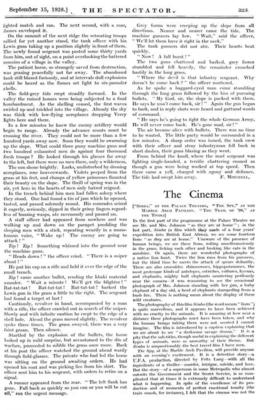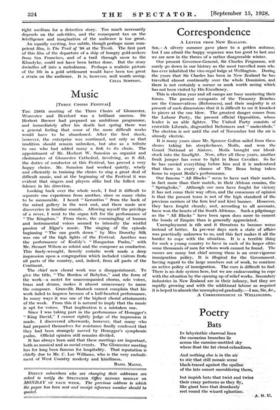The Cinema
PSIMBA," AT THE PALACE THEATRE. " THE SPY'," AT TILE MARBLE ARCII PAVILION. " THE TRAIL OF '98," AT THE TIVOLI] IN the first part of the programme at the Palace Theatre we see Mr. and Mrs. Johnson " as they arc at home " ; in the last part, Simba (a film which they made of a four years' expedition into British East Africa), we see some fourteen lions " as they are at home." Unaware of the presence of human beings, we see these lions, rolling unselfconsciously in the grass, licking each other and basking like cats in the sunshine. Or again, there are wonderful photographs of a native lion hunt. Twice the lion runs from his pursuers, but the third time he meets the attack of spears defiantly. There are also crocodiles rhinoceroses, hippopotamuses, the most grotesque kinds of antelopes, ostriches, vultures, hyenas, and elephants, mighty bull elephants sauntering perilously near the camera—it was reassuring to see the occasional photograph of Mrs. Johnson standing with her gun, a baby elephant of a day old, a herd of elephants stampeding from a bush fire. There is nothing mean about the display of these wild creatures.
The photography of this film Simba (the word means " lions ") is quite marvellous, and it appears to have been achieved with no cruelty to the animals. It is amazing at how near a distance these photographs must have been taken, and why the human beings taking them were not scented I cannot imagine. The film is introduced by a caption explaining that we are about to see " a darlcsome savage drama." It is a pity that the sub-titles, though useful in explaining the different types of animals, were so unworthy of their theme. But Simba is unquestionably the best travel film I have seen.
The Spy, at the Marble Arch Pavilion, will provide anyone with an evening's excitement. It is • a detective story—a U.F.A. production, directed by Fritz Lang—with all the ingredients of a thriller—murder, intrigue, suicide, and love. But the story—of a superman in some Metropolis who almost outwits the Government and the Secret Service, is so com- plicated that at times it is extremely difficult to understand what is happening. In spite of the excellence of its pro- duction and of moments of perfect emotional tensity (the train smash, for instance), I felt that the cinema was not the
right medium for a detective story. Too much necessarily depends on the sub-titles, and the consequent tax on the intelligence and imagination of the audience is too great.
An equally exciting, less subtle, though perhaps more com- petent film, is The Trail of '98 at the Tivoli. The first part of this film of the departure of a ship of hungry gold-seekers from San Francisco, and of a trail through snow to the Klondyke, could not have been better done. But the story dwindles off into a melodrama. Perhaps a realistic picture of the life in a gold settlement would have been too great a strain on the audience. It is, however, well worth seeing.
CELIA SIMPSON.







































 Previous page
Previous page